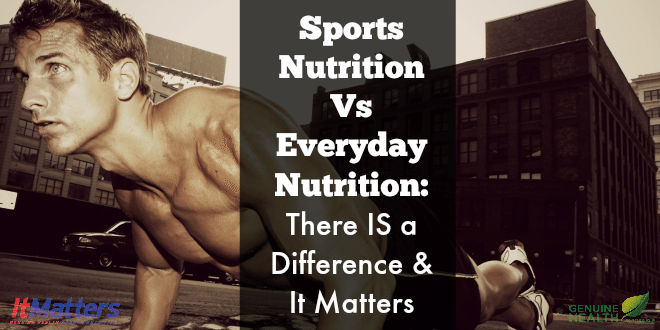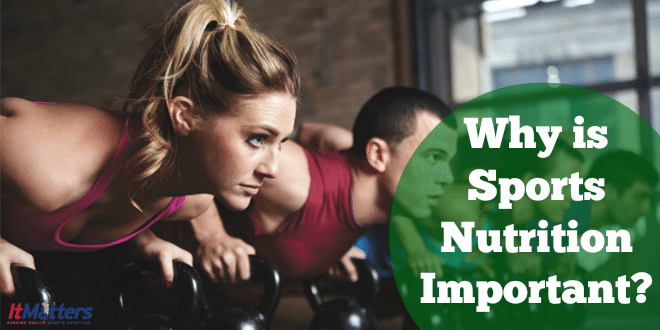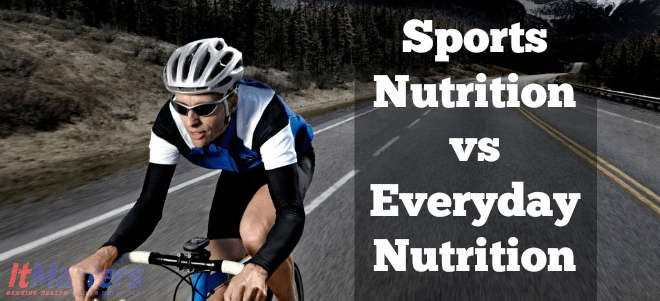Sports Nutrition Vs Everyday Nutrition - There IS a Difference and #ItMatters

There’s no denying it, if Men are from Mars and Women are from Venus, then Athletes are from a completely different solar system
. Men and women “eat”, athletes “fuel and nourish”
…
But like a fine sports car, not just any run of the mill gasoline will do. With such an abundance of online information covering the many areas of fitness and nutrition, there appears to be a growing misconception as to the relevance of certain dietary and supplemental practices, with people utilizing methods that are completely unnecessary for non-athletes.
[box type="info" align="alignleft" ]NOTE: I'm honored to announce my most recent partnership with Genuine Health. As someone who has been a user of Greens+ for nearly 20 years, I was ecstatic with the prospect of working with Genuine Health, a company that shares many of my same values, opinions and beliefs as it relates to nutrition, health and vitality. Over the next few months I will be exploring a variety of topics on sports nutrition, exploring the way #ItMatters to each of us.
Enough people like myself asked Genuine Health the same question: " Why did you create a sports nutrition line of products? "
Their answer...
[embed]https://vimeo.com/72264719[/embed]
[/box]

From pre- and intra-activity nutrition to eating for recovery from bouts of exertion, sports nutrition is essential to make sure not just optimal performance, but the health and well-being of the athlete in question.
Important factors to consider are:
Depending on whether we are talking about aerobic activities – for example, long-distance running – or anaerobic exercise – such as sprinting and intensive sessions of bodybuilding-style resistance training – different quantities of proteins, carbohydrates, and fats will be required to ensure rapid tissue repair, repletion of muscle glycogen, and optimal hormonal function, respectively.
Either way, there is no denying that the needs of the serious athlete are far greater and more extensive than that of the non-athlete.

Individuals who are sedentary or more casual weekend warrior types can no doubt ‘get away’ with regular alcohol intake, subpar dietary habits, and even insufficient hydration.
This is true because the physiological demands placed on an athlete can have profound and long-lasting effects on just about every bodily system, particularly the nervous system, and this is simply not the case for non-athletes.
With fashionable dietary trends such as Intermittent Fasting or IF[6], and If It Fits Your Macros or IIFYM[7], many athletic people may be short-changing themselves by not paying enough attention to the quality, measure, and even the timing of their nutrition.
This can seriously hinder performance and ongoing progress as the body is not being fueled in the ways that it needs.
The concept of ‘a calorie is a calorie’ is a gross oversimplification of the truth, and while the margin for error, if you will, may be greater or lesser depending on the person, this is essentially no different to pouring corn oil into the gas tank of your Lamborghini and wondering why it won’t deliver the goods!
 High performance machines need high performance fuel, so this piece should serve as an eye-opener to athletes who are neglecting the quality of their nutrition, while also reminding casual, hobbyist runners and gym-goers that they might not need to spend a fortune on expensive sports supplements.
High performance machines need high performance fuel, so this piece should serve as an eye-opener to athletes who are neglecting the quality of their nutrition, while also reminding casual, hobbyist runners and gym-goers that they might not need to spend a fortune on expensive sports supplements.
People who fall into the latter group will benefit from simple supplementation including basics such as whey protein powder, omega-3 fish oils, an active fuel and recovery formula.
Hard-training athletes, however, will need to pay far greater attention to their macro-nutrient and micro-nutrient intake. This could mean including more advanced supplements such as free form amino acids (BCAA's and Creatine), low osmolalty carbohydrate powders[8], and other items that may need to be added on a case-by-case basis.
Bottom line, sports nutrition isn't a means to the end. It's simply another way to augment one's nutrition to give the athlete the best opportunity to reach a specific goal. If you are training with a specific purpose and with a goal in mind, then fueling your body accordingly is a must.
If you don't think supplementation is important, I beg to differ and tell you that IT MATTERS!
[divider]
 This is my disclaimer, “Just so you know, I have been compensated to share my ideas on this topic. Sometimes it is in the form of products, or services or even money… But here’s the thing; I won’t share anything with you that I don’t fully support. It doesn't matter what it is, or how much they are willing to give me, if I don’t believe in it, It won’t be on my site. Seriously. You’ll just have to trust me on this.”
~ Moose
This is my disclaimer, “Just so you know, I have been compensated to share my ideas on this topic. Sometimes it is in the form of products, or services or even money… But here’s the thing; I won’t share anything with you that I don’t fully support. It doesn't matter what it is, or how much they are willing to give me, if I don’t believe in it, It won’t be on my site. Seriously. You’ll just have to trust me on this.”
~ Moose
[divider]
[toggle title="Quoted Sources" state="close" ]
[/toggle]
But like a fine sports car, not just any run of the mill gasoline will do. With such an abundance of online information covering the many areas of fitness and nutrition, there appears to be a growing misconception as to the relevance of certain dietary and supplemental practices, with people utilizing methods that are completely unnecessary for non-athletes.
[box type="info" align="alignleft" ]NOTE: I'm honored to announce my most recent partnership with Genuine Health. As someone who has been a user of Greens+ for nearly 20 years, I was ecstatic with the prospect of working with Genuine Health, a company that shares many of my same values, opinions and beliefs as it relates to nutrition, health and vitality. Over the next few months I will be exploring a variety of topics on sports nutrition, exploring the way #ItMatters to each of us.
Enough people like myself asked Genuine Health the same question: " Why did you create a sports nutrition line of products? "
Their answer...
[embed]https://vimeo.com/72264719[/embed]
[/box]
Why is Sports Nutrition Important?

From pre- and intra-activity nutrition to eating for recovery from bouts of exertion, sports nutrition is essential to make sure not just optimal performance, but the health and well-being of the athlete in question.
Important factors to consider are:
- Sufficient caloric intake, particularly complete proteins[1];
- Nutrient timing[2], especially in hours before, during, and after bouts[3];
- Adequate intake of vitamins and minerals[4]; and
- Sufficient hydration[5];
Depending on whether we are talking about aerobic activities – for example, long-distance running – or anaerobic exercise – such as sprinting and intensive sessions of bodybuilding-style resistance training – different quantities of proteins, carbohydrates, and fats will be required to ensure rapid tissue repair, repletion of muscle glycogen, and optimal hormonal function, respectively.
Either way, there is no denying that the needs of the serious athlete are far greater and more extensive than that of the non-athlete.
Sports Nutrition Vs Everyday Nutrition

Individuals who are sedentary or more casual weekend warrior types can no doubt ‘get away’ with regular alcohol intake, subpar dietary habits, and even insufficient hydration.
This is true because the physiological demands placed on an athlete can have profound and long-lasting effects on just about every bodily system, particularly the nervous system, and this is simply not the case for non-athletes.
Dietary Trends and Misconceptions
With fashionable dietary trends such as Intermittent Fasting or IF[6], and If It Fits Your Macros or IIFYM[7], many athletic people may be short-changing themselves by not paying enough attention to the quality, measure, and even the timing of their nutrition.
This can seriously hinder performance and ongoing progress as the body is not being fueled in the ways that it needs.
The concept of ‘a calorie is a calorie’ is a gross oversimplification of the truth, and while the margin for error, if you will, may be greater or lesser depending on the person, this is essentially no different to pouring corn oil into the gas tank of your Lamborghini and wondering why it won’t deliver the goods!
Conclusion
 High performance machines need high performance fuel, so this piece should serve as an eye-opener to athletes who are neglecting the quality of their nutrition, while also reminding casual, hobbyist runners and gym-goers that they might not need to spend a fortune on expensive sports supplements.
High performance machines need high performance fuel, so this piece should serve as an eye-opener to athletes who are neglecting the quality of their nutrition, while also reminding casual, hobbyist runners and gym-goers that they might not need to spend a fortune on expensive sports supplements.People who fall into the latter group will benefit from simple supplementation including basics such as whey protein powder, omega-3 fish oils, an active fuel and recovery formula.
Hard-training athletes, however, will need to pay far greater attention to their macro-nutrient and micro-nutrient intake. This could mean including more advanced supplements such as free form amino acids (BCAA's and Creatine), low osmolalty carbohydrate powders[8], and other items that may need to be added on a case-by-case basis.
Bottom line, sports nutrition isn't a means to the end. It's simply another way to augment one's nutrition to give the athlete the best opportunity to reach a specific goal. If you are training with a specific purpose and with a goal in mind, then fueling your body accordingly is a must.
If you don't think supplementation is important, I beg to differ and tell you that IT MATTERS!
In the coming months, stay tuned for #ItMatters follow-up posts as I explore the following:
- The Way of the Weekend Warrior: Recovery, it matters
- Health doesn't have to be difficult: Optimum Nutrition for Peak Performance
- The Athlete's Way: Prepare, Perform, Rebuild - then Repeat (Often!)
- Lactic Acid Sucks (but it doesn't have to): Why BCAA's and Creatine Work
- The Pre-pre-race preparation: 6 & 1/2 Sports Nutrition Tips
- The Whey or No Whey of Protein: Are Plants enough to fuel me?
- Getting the most from my WOD: Sports Nutrition Must Do's
[divider]
 This is my disclaimer, “Just so you know, I have been compensated to share my ideas on this topic. Sometimes it is in the form of products, or services or even money… But here’s the thing; I won’t share anything with you that I don’t fully support. It doesn't matter what it is, or how much they are willing to give me, if I don’t believe in it, It won’t be on my site. Seriously. You’ll just have to trust me on this.”
~ Moose
This is my disclaimer, “Just so you know, I have been compensated to share my ideas on this topic. Sometimes it is in the form of products, or services or even money… But here’s the thing; I won’t share anything with you that I don’t fully support. It doesn't matter what it is, or how much they are willing to give me, if I don’t believe in it, It won’t be on my site. Seriously. You’ll just have to trust me on this.”
~ Moose
[divider]
[toggle title="Quoted Sources" state="close" ]
- [1] Protein Needs for Athletes
- [2]Does Protein Timing Really Matter
- [3]Integrative Bodybuilding Peri Workout Recovery Supplementation - part 2
- [4] Sports Nutrition
- [5]Exercise Hydration
- [6] Intermittent Fasting
- [7] If it fits your macros
- [8]Integrative Bodybuilding Peri Workout Recovery Supplementation - part 3
[/toggle]




































































































